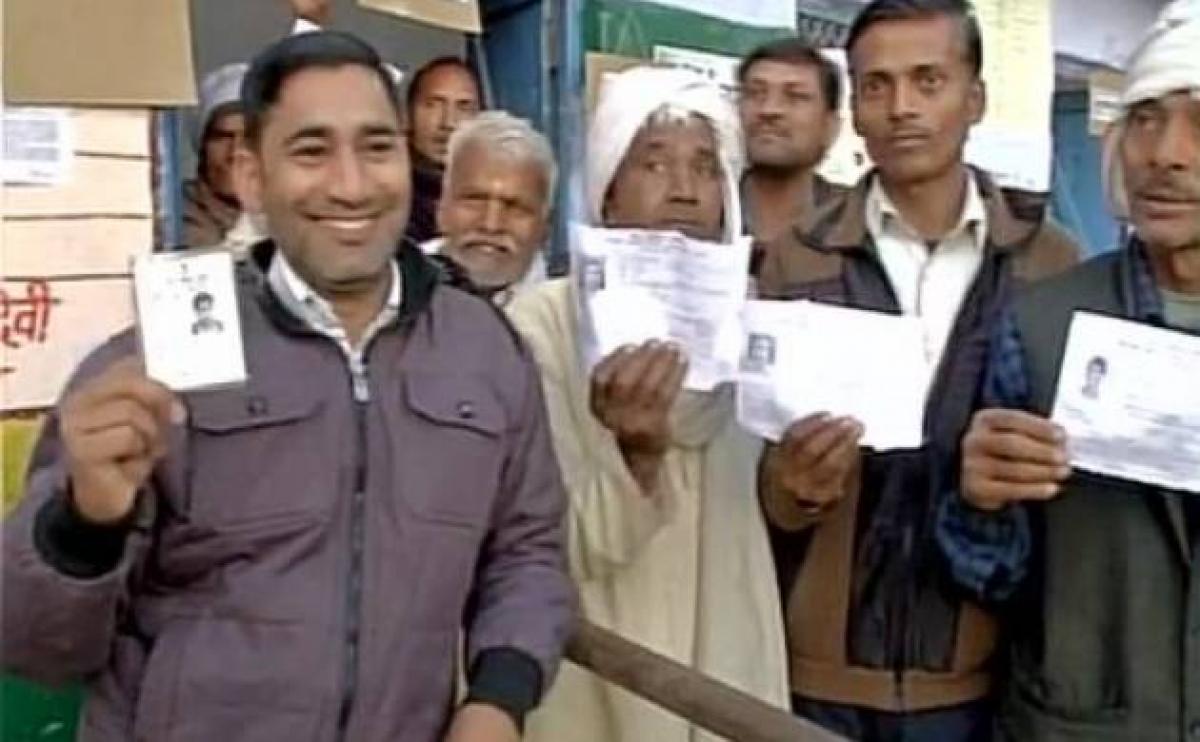Live
- TDP releases video songs highlighting AP govt’s failures
- KCR to kickstart his bus yatra from April 22
- EC observers review measures taken in Chevella LS segment
- Guntur: Kilari, Nandigam, Tenneti file nominations
- Govt releases Rs 50 cr for clearing weavers’ dues
- Vijayawada: Two-day international meet held on New Media
- BRS MLA Prakash Goud jumps ship to Cong, more to follow?
- Upbeat TDP cadres focus on one lakh majority for Naidu in Kuppam
- Bhatti knocks on doors of CPM for support in LS polls
- Rajamahendravaram: Purandeswari takes part in huge rally, files nomination
Just In

Voting began on Saturday morning in the first of the staggered seven-phase Assembly elections in crucial Uttar Pradesh, India’s most populous state.
Lucknow: Voting began on Saturday morning in the first of the staggered seven-phase Assembly elections in crucial Uttar Pradesh, India’s most populous state.
Nearly 2.6 crore people in 73 constituencies of western Uttar Pradesh are eligible to vote in the high-stake Assembly elections, seen as a litmus test for Prime Minister Narendra Modi's nearly three-year rule.
839 candidates, including from main contenders BJP, BSP, allies Congress and Samajwadi party, RLD as well independents, are in the fray from the seats in 15 districts where 26,823 polling stations have been set up.
Among the electorate are 1.17 crore women and 1,508 belonging to third gender category. The largest constituency in terms of electorate is Sahibabad, while Jalesar is the smallest. The maximum number of 26 candidates are in fray from Agra South, while the least number of aspirants are in Hastinapur which has six candidates.
Prominent contestants include Pankaj Singh (Noida seat), son of Union Home Minister Rajnath Singh, Congress Legislature Party (CLP) leader Pradeep Mathur (Mathura) against whom BJP spokesman Srikant Sharma is in fray, Mriganka Singh (Kairana), daughter of BJP MP Hukum Singh and controversial BJP MLAs Sangeet Som and Suresh Rana - Sardhan and Thanabhawan respectively.
Former BJP state president Lakshmikant Bajpai (Meerut), RJD chief Lalu Prasad's son-in-law Rahul Singh (SP) from Sikandarabad, and Sandeep Singh, grandson of Rajasthan Govenor Kalyan Singh from Atrauli are some other key figures.
In 2012, both SP and BSP bagged 24 seats each, with Rashtriya Lok Dal headed by Ajit Singh bagging nine and Congress five and BJP 11.
BJP is hoping to improve its performance as it had swept the state in the 2014 general elections, which gave the saffron party majority in Lok Sabha, and none of other parties could open their account in the region.
Elaborate security arrangements have been made in all districts. Around 6,000 paramilitary personnel are being deployed in all the 887 polling centres in Muzaffarnagar and neighbouring Shamli to instill a sense of fearlessness among voters, especially with focus on the areas which had witnessed communal riots in 2013.
Spearheading the BJP campaign, Modi had highlighted demonetisation as an "anti-graft" and "pro-poor" measure and promised to push his development agenda in the state.
Young guns Akhilesh Yadav and Rahul Gandhi, who have added a new dimension to the contest with the Samajwadi Party-Congress alliance, have claimed that BJP will face the wrath of the common man who "suffered" due to the note ban.
The first phase of voting in the Muslim-dominated region could throw light on the presence of All India Majlis-e-Ittehadul Muslimeen (AIMIM) led by Asaduddin Owaisi.
The Muslim-dominated areas in the belt will be an acid test for BSP chief Mayawati, who is banking heavily on Dalit and Muslim votes. The region was once BSP's favourite hunting ground.
The districts that have gone to polls in the first phase are Shamli, Muzaffarnagar, Baghpat, Meerut, Ghaziabad, Gautam Buddha Nagar, Hapur, Bulandshahr, Aligarh, Mathura, Hathras, Agra, Firozabad, Etah and Kasganj.
For all political parties, the stakes are high as the first phase is likely to set the tone for the elections in the remaining six phases.
The six other phases of polling will be held on February 15, 19, 23 and 27 and on March 4 and 8, while counting will be taken up on March 11.

© 2024 Hyderabad Media House Limited/The Hans India. All rights reserved. Powered by hocalwire.com







